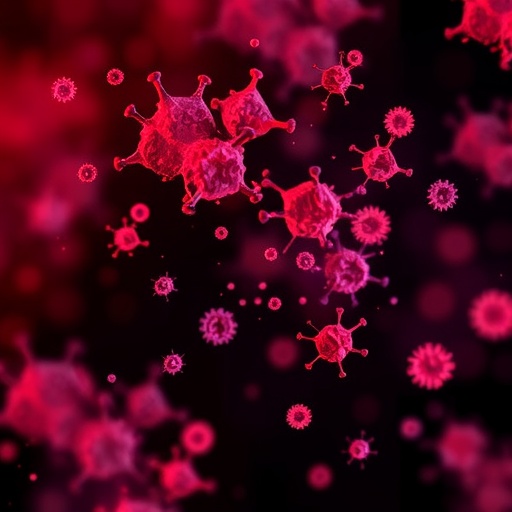In a pioneering investigation published in BMC Psychiatry, scientists have illuminated the complex interplay between the immune system and depressive disorders, revealing significant alterations in CD4+ T lymphocytes and cytokine profiles that correspond with the severity of depression. This groundbreaking research offers profound insights into the immunological mechanisms underpinning depression and suggests promising avenues for diagnostic and therapeutic innovation.
Depression, a multifaceted psychiatric condition marked by persistent low mood and cognitive disturbances, has increasingly been linked to immune system dysregulation. However, the precise immunological changes occurring at different stages of the disease have remained elusive. The study in focus meticulously dissected these changes by analyzing patients categorized into mild, moderate, and severe depression groups, comparing them against healthy controls to unravel biomarkers that parallel clinical severity.
Central to the study’s methodology was the assessment of peripheral blood CD4+ T lymphocyte subpopulations, namely Th1, Th2, Th17, and regulatory T cells (Tregs). CD4+ T cells play pivotal roles in orchestrating immune responses, with distinct subsets driving pro-inflammatory or immunosuppressive actions. Employing sophisticated flow cytometry techniques, the researchers quantified both the relative proportions and absolute counts of these subsets, thus providing an intricate immunophenotypic landscape associated with depressive states.
Their analyses revealed a marked elevation in Th1 and Th17 cells alongside a reduction in Treg cells across depressive states, indicating a shift towards a pro-inflammatory immune milieu. This shift was most pronounced in subjects with severe depression, who exhibited amplified Th1% and Th17%, coupled with decreased regulatory T cells. Such changes suggest an imbalance between inflammatory and regulatory arms of immunity, potentially contributing to the pathophysiology of depression through sustained immune activation.
Additionally, the team quantified key cytokines—cell signaling proteins that mediate and regulate immunity—in the serum using cytometric bead array technology. The cytokines IL-2, IL-4, IL-6, IL-10, IL-17, IFN-γ, and TNF-α were meticulously measured, uncovering a compelling pattern: IL-4 levels diminished progressively with increasing depression severity, whereas IL-6 levels rose correspondingly. These cytokines thus serve as reflectors of immune status, with IL-4 generally associated with anti-inflammatory responses and IL-6 with inflammation.
Statistical analyses confirmed a significant negative correlation between IL-4 levels and depression severity, and a positive correlation between IL-6 and severity. This bidirectional cytokine modulation highlights the shifting balance between inflammatory and regulatory mechanisms as depression advances. Crucially, IL-4 and IL-6 emerged as independent predictors of disease severity, underscoring their potential as biomarkers for clinical assessment.
The implications of these findings extend beyond diagnostics. The identified immunological signatures pave the way for novel therapeutic strategies targeting immune pathways. Modulating the Th1/Th2 and Th17/Treg axes or cytokines like IL-6 could offer innovative adjunctive treatments for depression, particularly for patients resistant to conventional antidepressants.
The study also enriches our understanding of the biological underpinnings of depression, framing it as a disorder with a pronounced immunological component. This reconceptualization challenges the traditionally neurocentric view and advocates for integrative models that encompass immune-neural interactions influencing mood regulation.
Moreover, by stratifying patients based on depression severity and correlating immune parameters accordingly, the researchers have established a nuanced framework that could facilitate personalized medicine approaches. Monitoring immune status might inform prognosis and guide tailored interventions aimed at restoring immune homeostasis and improving clinical outcomes.
These discoveries resonate with growing evidence implicating systemic inflammation in the etiology of psychiatric illnesses. The immune alterations documented here provide mechanistic insights, augmenting the field’s understanding of how peripheral immune dysregulation can impact brain function and behavior.
Future research building on these findings should explore the causal relationships between immune cell dynamics and depressive symptoms, including longitudinal studies to track immune changes over the course of illness and treatment. Experimental therapeutics targeting immune pathways warrant investigation to translate these immunological insights into tangible clinical benefits.
In conclusion, this landmark study delineates specific immune fingerprints associated with depressive disorders, characterized by heightened pro-inflammatory Th1 and Th17 cells, diminished regulatory T cells, and a cytokine shift favoring inflammation. IL-4 and IL-6 stand out as robust biomarkers indicative of depression severity. These advances not only enhance biological understanding but also spotlight immune modulation as a promising frontier in depression management, potentially revolutionizing approaches to diagnosis, monitoring, and therapy.
Subject of Research: Immunological alterations in CD4+ T lymphocyte subsets and cytokine profiles associated with depressive disorder severity
Article Title: CD4 + T lymphocyte and cytokine profiles in depressive disorders
Article References:
Zhang, W., Wang, C., Fu, T. et al. CD4 + T lymphocyte and cytokine profiles in depressive disorders. BMC Psychiatry 25, 911 (2025). https://doi.org/10.1186/s12888-025-07344-8
Image Credits: AI Generated
DOI: https://doi.org/10.1186/s12888-025-07344-8
Keywords: Depression, CD4+ T lymphocytes, Th1 cells, Th2 cells, Th17 cells, regulatory T cells, cytokines, IL-4, IL-6, immunology, biomarkers, psychiatry




